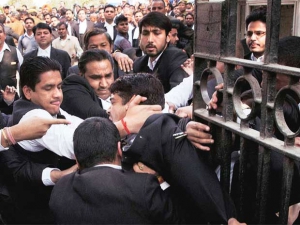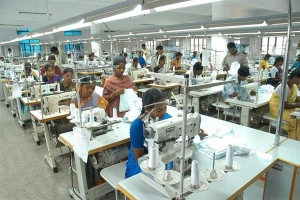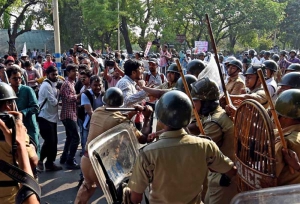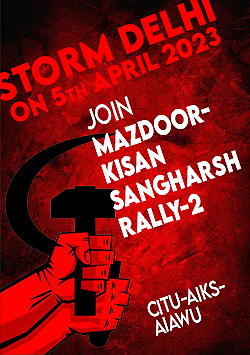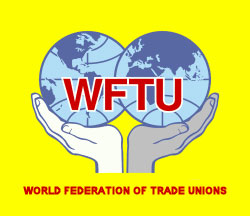Super User
CITU SECRETARIAT MEETING
PressCommunique 14th June 2016
CITU SECRETARIAT MEETING ON 13-14 JUNE 2016 CALLS FOR
· Countrywide Massive Solidarity Mobilisation In support of the peoples’ struggle against barbarous attack by Trinamool Congress Goons
· Extensive campaign for the Countrywide General Strike on 2nd September 2016
The National Secretariat of Centre of Indian Trade Unions in its meeting held on 13-14 June 2016 at New Delhi has taken the following decisions:
1. CITU congratulates the working people of Kerala for ensuring resounding victory of the Left Democratic Front in the just concluded Assembly elections
2. CITU also expresses serious concern and severe indignation at the barbarous attacks being unleashed by the Trinamool Congress goons on the people, particularly supporters of Left forces, trade unions and other mass organizations with active patronage of the state administration. CITU also has been targeted for this attack, assault and intimidations. Hundreds of offices were captured, ransacked even burnt, members and sympathisers are being assaulted and threatened to leave the organisation. A demonstration of inhuman barbarism throughout the state is going on with direct state-patronage and the purpose is to eliminate and mime the Left opposition through a reign of terror. It has reached to such heinous height that the TMC goons while carrying on physical assault on the people did not spare a pregnant woman and her baby was killed in the womb itself. Our comrades in West Bengal have not given the walk-over to such barbaric assault on democratic and human rights of the people and have been bravely fighting such assaults through mobilising people in different parts of the state. While extending solidarity to the people of West Bengal in heroically resisting the barbaric onslaught on democratic rights, with the toiling peoples’ organisation at the forefront of that battle, CITU already called upon the state committees to organise solidarity protest against the attack on democratic rights and reign of terror in West Bengal.. CITU Secretariat now calls for widespread countrywide campaign against ongoing barbarous attack on the people of West Bengal by the TMC goons with Govt support to culminate in massive demonstration/mobilizations in all the states and industrial centres on 28th June 2016.
3. CITU Secretariat has reviewed the preparatory campaign activities being undertaken in the states and industries for the call of countrywide General Strike on 2nd September 2016 against the anti-people and anti-worker policies of Narendra Modi Govt which is also aimed at imposing slavery on the working people in the country at the behest of corporate and big-business houses, both domestic and foreign. The call for General Strike was given jointly by almost all the central trade unions in the country from the National Convention of workers held on 30th March 2016 at New Delhi. The urgency for the countrywide strike action has become crucially important in view of the all round decline, disaster and gloom in the national economy as well as on the lives and livelihood of the common people brought about by two years’ rule by the BJP Govt at the centre. The media-hype sought to be created by the Modi Govt about the so called successes of its two years’ rule through its lie-campaign, must be given a fitting rebuff by the working people of the country through making the united call for countrywide General Strike on 2nd September 2016 a massive success. CITU Secretariat has called upon all the state committees, federations and unions to intensify the campaign for making the strike action aimed at reaching the widest sections of the workers and the people in association with other central trade unions.
4. The 15th All india Conference of CITU is going to take place on 26-30 November 2016 at Puri, Odisha in which around 2500 delegates from all over the country and across the industries and services are going to take part. The Conference will be preceded by the All India Convention of Working women to be held in Andhra Pradesh. The Secretariat discussed organizational details on the conference preparations including holding of the state level conferences in all the states.
(Tapan Sen )
General Secretary
CITU Condemns the Govt move for Induction of Private Sector Management in CPSUs
4th June 2016
Few days back the Narendra Modi Government has amended the Public Sector Recruitment Rules retrospectively providing appointment of candidates from private sector in very senior management positions in CPSUs and also in the PESB (Public Sector Enterprise Selection Board). Obviously profit-making Blue chip PSUs are the target of the Modi Govt in this regard. The argument from the Government is that this will help CPSUs in getting ‘capable and efficient’ hands from private sector. An expectation is generated that such steps of the Modi Government shall help in achieving better performance in the CPSUs.
CITU totally rejects such ill-motivated move of the Govt to induct private sector agents into the management of highly efficient and profitable CPSUs with huge resource and asset base operating in core and strategic sector of the economy.
It is very important to note that experience and expertise developed in CPSUs have been captured by private sector through various means. Take for example the energy sector. The management of Private enterprises in Oil & NG, Coal & Power etc. are all crowded with senior executives and many former CEOs from CPSUs. Very important technical and commercial classified information are smuggled by private sector from CPSUs. Without such resources from CPSUs the private big business in the many such industries would not have easily attained such so much success. Let us not go into the unethical practices of the private sectors here.
CITU condemns the NDA Government for the atrocious action. It is an act as well as conspiracy of conspicuously undermining the excellent record of physical and financial performance of CPSUs and their contribution in economic reconstruction of post independent India. Thousands of crore of rupees is collected from CPSUs by the Government through various instrumentalities including measures of privatisation and dividend, taxes and duties etc. Now the present design is to sabotage those successful CPSUs from within as supplementary to its grand-plan of strategic sale of CPSUs announced in this year’s budget. Also the step in question is to push more exploitative, repressive and authoritarian management system of private sector in the CPSUs by the corporative captive Modi Government.
CITU demands withdrawal of the amendment and restoration of age old time tested practice. At the same time CITU calls upon the trade union movement and the public sector employees as a whole irrespective of rank and affiliations to raise the powerful voice against the brazenly anti-public sector step of the Government and mobilize employees to stop entry of private management in our CPSUs.
Issued by
(TAPAN SEN)
GENERAL SECRETARY
MAY DAY MANIFESTO, 2016
On this May Day, CITU
Greets the working class and toiling people of the entire world and our own country, India;
Expresses solidarity to the fight of the working class and people of all the continents against the exploitative international finance driven neoliberal capitalist order;
Extends solidarity to the people in socialist countries and their struggles in defence of socialism in their countries; reaffirms its confidence that imperialist conspiracies to undermine socialism and restore capitalism in these countries would be decisively defeated
Reasserts its commitment to socialism and its resolve to continue the fight to end the exploitative capitalist regime
Reiterates its solidarity and support to the valiant struggle of the Palestinian people against the illegal occupation of their country by Israel backed by the USA, defying world opinion; demands recognition of independent sovereign state of Palestine with 1967 borders and Jerusalem as its capital
Strongly denounces US imperialism led wars in different parts of the globe including Syria, Afghanistan, Iraq etc to establish US hegemony over the strategic natural resources and areas in the world; hundreds of thousands of people, most of them civilians, women and children have been killed, rendered homeless and destitute as a result of these imperialist military aggressions forcing them to leave their homes and seek refuge elsewhere
Upholds the principle that the fight against imperialism is an integral part of the class struggle against exploitation; reaffirms its determination to fight against imperialism and its aggressive interventions
Recalls the contributions of the World Federation of Trade Unions in leading the international struggle of the working class against imperialism; asserts its faith that the 17th Congress of WFTU in October will be another milestone in WFTU’s efforts to mobilise the world working class against imperialist onslaughts on the toiling people across the world
Stands in solidarity with all the people across the world in their struggles against exploitation and onslaught on their rights
Extends support to the surging struggles within the country against the attacks on democratic rights; condemns the attacks on students and universities expressing differing opinions or encouraging debate; supports the students and youth asserting their fundamental rights of freedom of expression
Salutes the working class and other toiling people of West Bengal for heroically resisting the inhuman attacks of the TMC government and its goons
On this May Day, CITU
Notes that, all the clamour about recovery notwithstanding, the global economic crisis continues unabated, with signs of aggravation in several parts of the globe since the last over eight years; the
CITU.....
attempts by the ruling classes to come out of the crisis by aggressively shifting the burdens on to the common people – by attacking their lives and livelihoods and curbing their hard won rights in the name of ‘austerity’ while protecting corporate profits and promoting their loot on the common people and national assets - have not only proved futile but also counter productive; in fact they carry the seeds for the next, in all probability a more devastating, crisis; unemployment and job losses have attained intolerable proportions exposing the total failure and inability of the capitalist system in the full and proper use of the precious human resources to improve the well being of humanity
Demands that working hours be reduced to 35 hours a week and working day to comprise four shifts, as a means for employment generation and an immediate measure to address the serious unemployment situation in the world
Observes that the increasing discontent and anger of the people against the impact of the pro corporate and pro rich neoliberal policies, against the widening income disparities have led to their growing participation in struggles to protect their working conditions and livelihoods; increasing sections of people – workers, peasants, youth, unemployed, women - are getting gradually disillusioned with the capitalist model of development that has resulted in obscene levels of inequality and disparity with 62 richest people owning wealth equal to that of half the world’s population; 1% of people owning more than that by the other 99% combined; the wealth owned by the poorest 50% of population dropped by 41% between 2010 and 2015; in India, trend is almost the same, rather more obscene- richest 1% Indians own 53% of country’s wealth while the top 10% own 76.3%
Notes with utmost concern that in the absence of a strong progressive and left alternative, in several countries right wing, retrograde, reactionary and racist forces are gaining ground and trying to divert peoples’ anger into fratricidal fights against one another, to prevent it being channelised into united struggles against the discredited neoliberal regime and the capitalist system itself
Pledges to direct all its resources, energies and initiatives to spread awareness among the working class and the toiling people in general about the real culprit of their miseries and depravations – the exploitative capitalist system, to rouse them to the urgent need to uproot it and to prepare them for the ultimate struggle to end all exploitation
On this May Day, CITU
Warns the people of our country India, about the twin dangers that confront the working class and all sections of the common people today – the neoliberal policies zealously being pursued by the BJP led Modi government resulting in deterioration of the conditions of our working people on the one hand, and the vicious attempts to weaken the struggles against these policies by dividing people on the basis of religion, region, caste, etc and disrupt their unity, on the other
The Modi led government at the centre is pampering the national and multinational corporations and big business houses with bonanzas – tax concessions, rewards to tax and bank loan defaulters, and exemptions from laws of the land including labour laws. It is handing them control over the nation’s wealth – our public sector, our lands, our mines, our seas, our hills and our forests, and most of all, our people, for unbridled exploitation.
At the same time, the vast majority of workers and the peasants who produce wealth expending their sweat and blood are being pushed into slavery and penury; they are denuded of their lands, their jobs, their rights and their livelihoods. Laws are being amended to make the illegal legal, to legitimise corporate loot of our people and our national resources; expenditure on social welfare
CITU.....
benefits like ICDS, MGNREGA, NHM, Midday meal programme etc are being drastically cut; agrarian crisis and peasant suicides continue unabated; despite all the hype of ‘Make in India’, ‘Start Up India’ and ‘Stand Up India’, employment generation remains elusive, in fact, it is slowing down.
There is a serious attack on the basic democratic rights of the people. Dissent is sought to be curtailed. Voices that question are being suppressed. Driven by the communal fascistic ideology of the RSS, the various communal outfits of the Hindutva brigade are on rampage physically attacking and even killing those who hold views opposed to theirs, those who stand for progressive, rational and scientific thinking. All those who differ from their views are being branded ‘anti national’. Threats of ‘killing lakhs’ ‘cutting off the tongues’, ‘chopping off the heads’ etc emanate from people holding constitutional positions as ministers, MPs, MLAs etc of the ruling BJP, with the benign and tacit support of the government.
It is the irony of our times that RSS, an organisation which had consciously kept itself aloof from the nation’s independence struggle, today seeks to appropriate to itself the right to certify patriotism and nationalism; BJP, the party that leads a government pursuing policies detrimental to our national interests, question the patriotism of those who oppose such anti national policies!
On this May Day, CITU
Reminds the people of our country that the communal fascistic acts of the Hindutva forces, in turn, increase the danger of minority fundamentalism and terrorism;
Reasserts its strong belief that that majority and minority fundamentalism thrive on each other; both divide people, disrupt their unity, divert their attention from their real day to day issues, weaken their struggle to improve their lives; and ultimately both help the exploiting classes
Reiterates its conviction that the struggle for defending, widening and consolidating the unity of the class and the people against the communal, jingoist and disruptive forces is integral to the united struggle against neoliberal economic order and its political advocates
Is conscious that this conviction places upon its shoulders - the task of uniting all sections of toiling people in the struggle against both neo liberalism and fundamentalism and the politics that promote both; the tasks of advancing the struggle to achieve a comprehensive change in the correlation of class forces in favour of a Left Democratic Alternative
Exhorts the working class of the country to be in the forefront to unite all sections of toiling people - the peasants, agricultural workers, unemployed and youth; to raise in one voice their strong opposition to the neoliberal agenda of the ruling classes; and to resist all attempts to disrupt their unity, whether in the name of religion, caste, region or gender
Calls upon the entire working class of the country, irrespective of their trade union affiliations or lack of any, to join the countrywide general strike on 2nd September 2016 as decided by the joint platform of central trade unions and industrial federations; urges the common people, in urban and rural areas, to extend their full and wholehearted support to this strike that raises demands not only of the workers, not only of all sections of toiling people, but demands intended to protect our self reliant economy and national sovereignty
CITU.....
On this May Day 2016, CITU appeals
To the working class of India
To widen and deepen its unity irrespective of trade union affiliations and strengthen united struggles against the anti worker, anti people and anti national neoliberal policies of the government
To strengthen bonds of solidarity across sectors and states to resist and defeat the attacks on their rights, on their jobs, on their livelihoods and living conditions
To forge unity with all the other sections of toiling people, the peasants, agricultural workers, artisans and other rural workers to take the struggle against the neoliberal regime to a higher level to inflict its decisive defeat
To identify the real cause of their worsening conditions – the capitalist system and the politics and forces that promote the system; and to prepare themselves for the struggle to change this exploitative system
acquistare cialis 20 mg, Ravenna - dove acquistare il genericoTo be vigilant against the attempts to divide and disrupt its unity, in whatsoever garb or colour it is presented and to promptly intervene to thwart all such attempts
On this May Day 2016 CITU
Raises its voice in support of
International Solidarity of the Working Class
Unity Against all Exploitation and Oppression
Down With Capitalism and Imperialism
Down With Imperialist led Neoliberal Globalisation
Long Live Socialism
Workers of the World Unite
prix cialis en france http://www.subcavasonora.com/rocknbowl/wp-content/themes/santorini/inc/98604.html.
Rich in Rhetoric; Poor in Substance
29.02.2016
Union Budget 2016 – 17 presented by the Union Finance Minister Arun Jaitley is nothing but a grand exercise in rhetoric totally devoid of anything substantial that provides relief to the common people and workers. The Finance Minister sought to camouflage his government’s drive to provide further benefits to the corporate sector by resorting to high sounding words. Given the continuing global economic volatility and vulnerability in the capitalist system, the figures of GDP, Current Account Deficit and fiscal deficit are subject to many internal and external factors and have to be taken with a pinch of salt.
Instead of proposing effective measures to address the burning issue of price rise, the Finance Minister pats himself on the back claiming that inflation has come down even when the daily experience of the people is otherwise. Attempts to address unemployment by opening of skill development centres, when hundreds of thousands of our educated and skilled youth do not find suitable and decent jobs do not make any sense. While the ban on recruitment in government continues and thousands of jobs are being lost across many industries, in the Finance Minster ridiculously hopes of generating employment by paying the employers’ share of provident fund for three years.
The Union Budget sounds the death knell for the public sector, proposing disposal of assets of public sector undertakings including land, in addition to disinvestment of shares. The name of the Department of Disinvestment is being deceptively changed to Department of Investment and Public Asset Management. The upstream oil sector has been further widened for private sector, both domestic and foreign. Huge concessions have been made to prospective private oil corporates. Public sector general insurance will be disinvested. 100% FDI is proposed in marketing food products produced in India.
The Motor Vehicle Act is going to be amended opening up passenger transport to private parties resulting in the death of the state public road transport corporations. The Health Protection scheme announced in the Budget only indicates that the government is withdrawing itself from its responsibility of providing universal health coverage and moving towards health insurance that would mainly benefit the insurance companies.
While the announcement to speed up rural electrification is laudable, the fact is that today around 1 lakh mega watt power generation capacity is lying idle due to the high cost of electricity. Merely providing electric connections is not going to help unless electricity tariffs are brought down and the purchasing capacity of people is increased.
Rather than taking strong action to recover the alarming amounts of defaults by big corporate houses to public sector banks, the government has provided for recapitalisation of public sector banks to brush up their balance sheets, thus setting the defaulters go scot - free.
While the Finance Minister talked of reduction in corporate taxes there is no enhancement of income tax slabs adversely affecting the lakhs of central and state government and public sector employees. On the other hand, workers’ life long savings in Provident Fund are being taxed.
The revenue loss due to reduction in direct taxes is to the tune of Rs 1060 crores while an additional burden of Rs 20670 crores has been imposed on common people through indirect taxes.
The allocation to agriculture and farmer welfare is too meagre to address the serious agrarian crisis that has seen an increase in farmer suicides. It amounts to just eye wash.
The government has again neglected the unorganised workers and the scheme workers in this Budget. Despite the consistent demand of the united trade union movement to constitute national fund for providing social security benefits for the unorganised workers and to recognise the lakhs of anganwadi employees, ASHAs, midday meal workers, NCLP staff and other sections of scheme workers as workers and provide them minimum wages and social security benefits, this Budget totally ignores these demands. While none of the points raised by the central trade unions in the pre budget meeting have been addressed, the government generously accepted the demands of the employers. The Budget does away with the mandatory weekly holidays in shops and other commercial establishments thus denying the tens of lakhs of shop employees of their holidays and increasing their working hours.
On the whole this Union Budget once again proves the commitment of this BJP led government to the neoliberal agenda and its eagerness to satisfy its corporate and big business bosses at the cost of the workers and common people.
Issued by,
TAPAN SEN
General Secretary
CITU CONDEMNS THE ATTACK ON JNU BY COMMUNAL HOOLIGANS
Centre of Indian Trade Unions (CITU) demands the immediate release of the JNU Student’s Union President Kanhaiya Kumar who was arrested under the charge of sedition without any evidence. It demands that this baseless charge against him and other students be withdrawn at once.
CITU strongly condemns the attacks on him by the RSS/ BJP goons at the Patiala House courts. Several other students, faculty members, journalists and advocates were also injured in the assault repeated for the second time within the court premises.
CITU deplores Delhi Police for its absolute negligence in effectively carrying out the Supreme Court direction to provide adequate security to Kanhaiya Kumar. The same incident of attack by some lawyers along with hooligans was again repeated on the second day when Kanahaya Kumar was brought to the Court premise. The Delhi Police, which functions directly under the Union Home Ministry, has not taken any action against the BJP MLA who has been caught on camera leading the physical attack on the students and media persons within the Patiala Court premise. These hooligans also tried to manhandle the team of senior lawyers sent by the Supreme Court to investigate the matter. This is in total contrast to the attempts to clamp down on the progressive and democratic student movement and malign a nationally and internationally renowned institution like the JNU, based on an isolated incident, which does not reflect the opinion of the vast majority of the students or the faculty. This clearly proves the premeditated move by RSS outfits in that game plan to attack progressive and democratic movement with the active support of the administration under BJP regime.
These are nothing but part of the nefarious design of the RSS to suppress progressive and rationalist thinking and forcibly impose its regressive ideology. These attacks are meant to silence dissent or any views opposed to its own in premier educational institutions, by the Modi led BJP government. Attack by various RSS outfits on the offices of Left parties and student organisations at different parts of the country during the span of last few days also expose their nefarious design.
This attitude to suppress opposition and attack those who hold different views has serious implications for the democratic and working class movements. In fact the entire game plan is to divert the attention of the people from the all round failure of the anti-people NDA regime having disastrous impact on the lives and livelihood the common people at large.
CITU warns these retrograde and reactionary forces that people’s voices cannot be silenced through such heinous attacks. It calls upon the working class and the trade union movement to unitedly thwart the attacks of the Hinutva forces on the democratic rights of the people and join the struggle to protect the JNU from the onslaught of the Hindutva forces.
Issued by
( TAPAN SEN )
General Secretary
CITU Denounces the Govt move for Strategic Sale of PSUs Calls for Countrywide Protest
As per a report in one of the leading National English Dailies, ‘The Hindu’ dated 5th February 2016, the government of India is planning to go in for strategic sale of some of India's most efficient and highly profitable PSUs. It is also planning aggressive disinvestment of shares in other PSUs. This obviously is meant to hand over our country’s basic economic strength at cheap rates when the stock market is depressed thus benefiting the global players. Even if partially true, these measures will be disastrous for national interests and the interests of the people.
The globally competitive engineering giant BHEL, the profitable oil PSUs like ONGC, HPCL, BPCL, IOC, the Defence sector PSUs like BEML, HAL etc have been initially short listed for the strategic sale as per the report. This is tantamount to putting the country on sale, reflecting the desperate economic condition in the country, despite the high sounding claims of the government. The patriotic people of our country cannot tolerate this disastrous game of the BJP government at the centre.
CITU strongly condemns the very idea of such sale out of the country's blue chip PSUs contributing handsomely to national exchequer besides making capital investments in the national economy out of their own resources.
India cannot be allowed to put on sale. CITU urges upon the government to desist from such disastrous exercise. CITU calls upon the working people and the trade unions irrespective of affiliations to launch immediate protest against such move at each work place and also through sending fax/ emails to Union Finance Minister and the Prime Minister demanding ‘Stop disinvestment in PSUs; No to strategic sale’.
Issued by,
Tapan Sen
General Secretary
Central Trade Unions decide to continue action against Central and State Govts. Anti-Labour Policies All India Protest Day on 10th March, 2016 on 12 point charter
Dated 28.1.2016
New Delhi: All the Central Trade Unions met on 27th January 2016 and resolved to continue their protest action against the anti labour policies of the Central and some State Govts. Central Trade Unions decided to observe 10th March, 2016 as All India Protest Day against Govt. indifference to the 12 point charter of demands and its unwillingness to restart discussions for working out concrete steps for resolution of the issues.
The Central Trade Unions reviewed the drastically deteriorating conditions of work and life of the working people and govt. going ahead with labour law amendments, disinvestment of PSUs and allowing FDI in strategic sectors. The Govt., it appears, does not want to wait for legislating these anti worker labour law amendments, it is taking away rights of workers by way of executive orders and directing state govts to carry out such pro-management amendments. The trade unions condemned one such directive issued by the Secretary, Ministry of Labour and Employment, Govt. of India on this 12th January granting exemption to so called start up enterprises from inspection and application of 9 major labor law legislations, thereby legitimizing the violations.
The Central Trade Unions took note of and extend solidarity to the sectoral struggles of workers/employees in Banks, Defence, Coal, Port and Docks and Telecommunications sectors, the anganwadi workers on their respective demands and also the Central Govt. employees including Railways resolve to launch action against retrograde recommendations of 7th Central Pay Commission. They also expressed their serious concern over extremely harsh punishment of “double life imprisonment” given by the Court to eight workers of Pricol Ltd., Coimbatore and appealed to all workers to extend help and solidarity.
The Central Trade Unions also decided to organize massive National Convention of Workers in Talkatora Stadium, New Delhi in the last week of March, 2016 to decide about the next course of united action programme.
Fight against anti labour policies will continue. The Central Trade Unions directed its constituents to prepare jointly for protest action on 10th March, 2016. They also appealed to independent employees/workers/unions and federations to participate in the protest action against the offensive of the Govt. against workers and common people.
CITU DENOUNCES GOVT DECISION TO VIRTUAL EXEMPTION FROM LABOUR LAWS TO MANY ESTABLISHMENTS IN THE NAME OF PROMOTING START-UP COMPANIES
27TH January 2016
The Centre of Indian Trade Unions denounces the brazenly anti-workers design of the Govt of India to grant virtual exemption from the obligations under nine basic labour laws to start up companies including five year old registered establishments with a annual turnover of not more than Rs 25 crore on the plea of “handholding and nurturing” the so called start-up companies, announced by the Prime Minister only recently.
In a letter no Z-13025/39/2015-LR-Cell dated 12th January 2016, the Labour Secretary, Govt of India directed all the heads of organizations like EPF, ESI etc to take immediate action accordingly in respect of their area of enforcement.
The start-up entities are defined as those incorporated or registered not prior to five years with annual turnover, not exceeding Rs 25 crore. These entities, as per the notification made by the Labour Secretary, GoI, would be allowed to self-certify compliance with the 9 basic labour laws viz., Industrial Disputes Act 1947, Trade Unions Act 1926, Building &Other Construction Workers Act 1996, Industrial Employment (Standing Order) Act 1946, Inter-State Migrant Workmen Act 1979, Payment of Gratuity Act 1972, Contract Labour (Regulation & Abolition) Act 1970, the EPF Act 1952 and ESI Act 1948. This means there will be no inspection by the enforcement machinery in all these establishments at least for three years allowing the concerned employers to violate freely these basic labour laws.
Already many big corporate houses, both domestic and foreign have been showing interests in channelizing their business through these so called start-up companies to take advantage of the three years tax holidays and exemption from inspection by tax-officials for the start-ups by Govt of India. To add to these huge concessions, they have been allowed exemptions from obligations under all basic labour laws including the social security and welfare related ones, imposing conditions of virtual bonded labour on the workers employed or going to be employed in these start-up entities.
Different Central Govt agencies like EPFO and others already jumped in haste to instruct their regional offices not to inspect these so called start up entities including five-year old registered companies in respect of compliance of EPF Act etc.
It has become clear that for the Govt of India, incentivizing, hand-holding or promoting investments means suppression of workers’ rights, not to allow formation of trade unions, denying welfare benefit to construction workers, reckless contractorisation and denial of basic social security benefit like EPF, ESI etc.
Such brazen anti-workers design sought to pushed through in a dubious and deceptive manner warrants all out condemnation and opposition by the trade union movement irrespective of affiliations. CITU calls upon the working people and the trade union movement to expose such anti-worker deceptive design of the NDA Govt unitedly.
(Tapan Sen )
General Secretary
CITU DENOUNCES DESTRUCTIVE EXERCISE ON FDI BY THE MODI GOVT
The Centre of Indian Trade Unions denounces the reckless move of the Narendra Modi Govt in liberalising foreign direct investment in numerous sectors of the economy including core and strategic sectors of economy much to the detriment of national interests. Strategic sector like defence(49%), airlines(49%), banking(74% for both FDI and FII) and media & broadcasting(100%) are being opened up to FDI through automatic approval route. FDI in single brand retail, construction, plantations etc will also be allowed through automatic approval route. FDI cap has been liberally increased from 74% to 100% for several sectors including non-scheduled air-transport service, ground handling, credit-info firms and satellites. Along with allowing 74% FDI in banking sector, the limits on the portfolio investors in the sector has also been eased up. Also notable is the hike in FDI to 49% in news channel and radio and 100% in DTH, cable networks, mobIle TV and teleports which will lead to near total control of media sector by foreign monopolies. FDI with automatic approval will now be allowed to 32 new investment areas covering crucial and strategically important sectors of the national economy. Cap for approval of foreign investment has been liberally raised from existing Rs 3000 crore to Rs 5000 crore.
All such drastic decisions on opening crucial sectors of our economy has been made by the Modi Govt even by evading the formal decision/approval by Cabinet, not to speak of Parliament which is scheduled to meet within next two weeks time on and from 26th November 2015. Following the humiliating defeat in Bihar election, the discredited Narendra Modi Govt has become desperate in banking upon and appeasing their foreign patrons jeopardizing national interests, that too just before the Prime Minister’s visit to London, Malaysia, G-20 and Singapur.
And none of the above concessions to foreign capital is going to benefit the national economy except creating more job-losses through unleashing a process of further de-industrialisation and destruction of domestic capacities. Such retrograde move will kill much more jobs than assumed to generate.
The trade union movement has already recorded their vehement protest against such brazenly anti-people policies and the policy of such mindless drive for FDI through massive countrywide general strike on 2nd September 2015. It appears, the Govt at the centre is still refusing to draw the right lesson and see reasons.
The CITU urges upon the Govt of India to desist from such retrograde design of harming the country, the economy and the people.
CITU calls upon the working people of the country to unitedly condemn such desperate bid of the Govt to make this country and her people a hunting ground and object for loot and exploitation and raise their voice of protest and opposition. CITU also calls upon the trade union movement to prepare for intense countrywide united struggle against the destructive anti-people policies of the Govt.
Issued by
( TAPAN SEN)
CITU CONDEMNS BRUTAL POLICE LATHI CHARGE AT KOLKATA
The Centre of Indian Trade Unions denounced the brutal lathicharge by police on the peaceful procession at Kolkata on 1st October 2015 demanding impartial role of police in maintaining law and order and protection of citizens' rights instead playing a partisan role in protecting as well as assisting the TMC hooligans perpetrating atrocities on the peace loving-people.
The procession to police headquarter at Lalbazar, Kolkata was organised by Kolkata District Left Front Committee which was joined by mass of the common people to voice their indignation against the affront on the democratic rights of the people by the TMC hoodlums at the behest of the state govt in order to silence the people from even expressing their dissent to intolerable misrule and anarchy by the state govt in all walks of life. The programme had been to submit a memorandum to police headquarter urging them to play their mandated role as per the constitution of the country in an impartial, non-partisan manner.
The procession comprising several thousands of people, men and women was totally peaceful and the police pounced upon the peaceful rally without any provocation in the same style of TMC hoodlums and brutally lathicharged severely injuring many including several women.. General Secretary of West Bengal CITU, Dipak Das Gupta sustained severe head injury and had to be admitted in Hospital.
CITU condemns such brutal attack on the people without any provocation which is nothing but a ploy of the TMC Govt to terrorise and silence all opposition to their disastrous misrule in the state. The workers in the state also are facing similar atrocities by TMC-goons-Police combine in their day to day struggles including the on the occasion of last countrywide general strike on 2nd September 2015.
CITU calls upon the working class and people from all walks of life to unite and resist such fascistic and hoodlum regime in the state by unitedly asserting their democratic rights to oppose, protest and resist on every occasion and opportunities of expressing themselves in defence of democracy. CITU calls upon the CITU committees in other states to take initiative to organize solidarity in support of struggling people in West Bengal.
Issued by,
Tapan Sen
General Secretary




